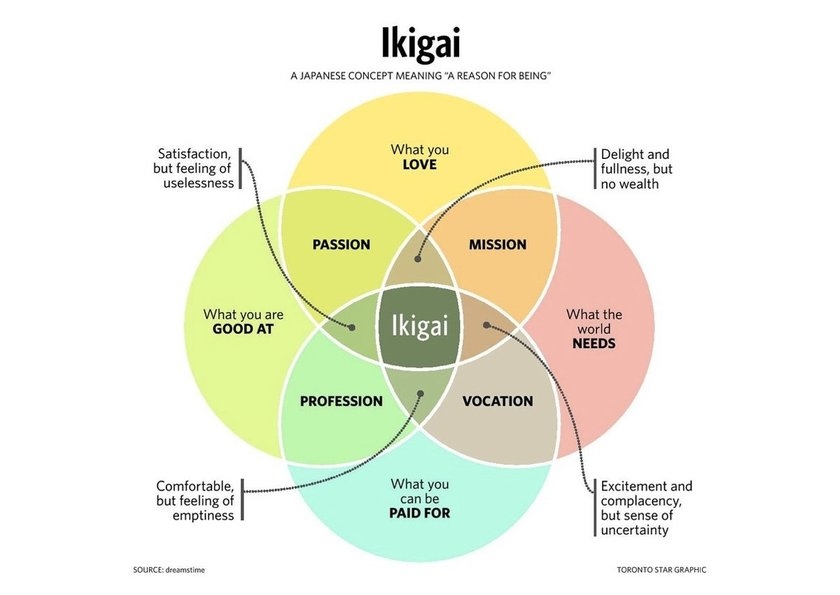The "Fun" Framework
How do you design your life? There are many guiding frameworks.
For example, Jim Collins has this framework:
 It is the intersection of ‘What will people pay you for’, ‘What you are good at’, ‘What you are born to do’ surrounded by ‘Who is on the bus with you’
It is the intersection of ‘What will people pay you for’, ‘What you are good at’, ‘What you are born to do’ surrounded by ‘Who is on the bus with you’
I might have rephrased some of this. Listen to this amazing podcast featuring Tom Kelley where Tom mentions this framework right towards the end.
The Japanese concept of Ikigai, is not too dissimilar, and adds a fourth circle:

Besides ‘What you can be paid for’ and ‘What you are good at’, it adds ‘What you love’ and ‘What the world needs’.
Then, there’s Hugh MacLeod’s ‘Sex and Cash theory’. It goes something like this:
(image: hugh.png caption: The Yin and Yang of sex and cash width:50%)
This is what he writes:
The creative person basically has two kinds of jobs: One is the sexy, creative kind. Second is the kind that pays the bills. Sometimes the assignment covers both bases, but not often.
A good example is Phil, a NY photographer friend of mine. He does really wild stuff for the indie magazines- it pays nothing, but it allows him to build his portfolio. Then he’ll go off and shoot some catalogues for a while. Nothing too exciting, but it pays the bills.
My friend Carissa Carter created this for herself:

See this video where she shares the amazing story of how she came up with it.
She says it best, as to why a framework helps:
When I did that it was not like I knew what I wanted to do, but I knew I was going to be okay. I won’t even call it a plan but it was something to look at that was grounding.
I offer another one, I call it ‘The Fun Framework’:

(There were too many Venn diagrams, so I went with the weird alien hand instead. It's about having fun and having the ability to have fun)
A few months ago I left my job. I didn’t know what I was going to do next. I wanted to wayfind, instead of navigate. I wanted to take time off and not worry about what was next.
And yet, it’s incredible how much void and angst a lack of busyness creates. The inner voice that says you are bumming around longer than you should. Having 16 equally exciting ideas to pursue now that I was free to choose. The fear of not knowing about my next pay cheque, even when I had saved up. Not having much to say about work at social gatherings (“I am between jobs” // “I am figuring it out” // “I am funemployed”).
Irrespective, the time-off and forced reflection helped birth this framework.
The Fun Framework has just two parts. Have fun, and make sure you are able to have fun.
What do I mean by fun? What is fun to do?
- Fun is working on a hard problem
- Fun is a road trip with your friends
- Fun is a pint of Ommegang Hennepin
- Fun is learning something new
- Fun is making a difference
- Playing a team sport is fun
- Practicing a hobby is fun
- Playing video games is fun
So I don’t just mean frivolous hedonistic fun. I also mean meaningful, joyous fun. Whatever is fun for you.
What do I mean by the ability to have fun?
- Being in good mental and physical health
- Staying connected with friends and family
- Having the requisite amount of money
- Having time to pursue the kind of fun that matters to you
- Having great people to collaborate with on a project or problem
- Making sure we don’t destroy the very planet we live on by the second-order consequences of our work (yes, I know this one is a bit intense)
On occasion these align. A ‘dream job’ is one where work itself is fun and it also generates money.
Sometimes they don’t. ‘Working for the weekend’ is when you spend your week gaining ability and then spend the weekend having fun.
Other times it can be a little unclear. One of my friends once told me “Mujhe paise kama ke mazza aata hai. (Translation: The act of earning money brings me joy). I think his fun comes from a place of creating value that people would part their hard earned money for rather than a blind pursuit of money.
In some ways, it is similar to Hugh MacLeod’s Sex and Cash theory, but the words are more meaningful to me.
I am prototyping this right now. Let’s see where it takes me. But like Carissa says, I think I am going to be okay. It is something I can look at and feel grounded, even though I don’t have a plan.